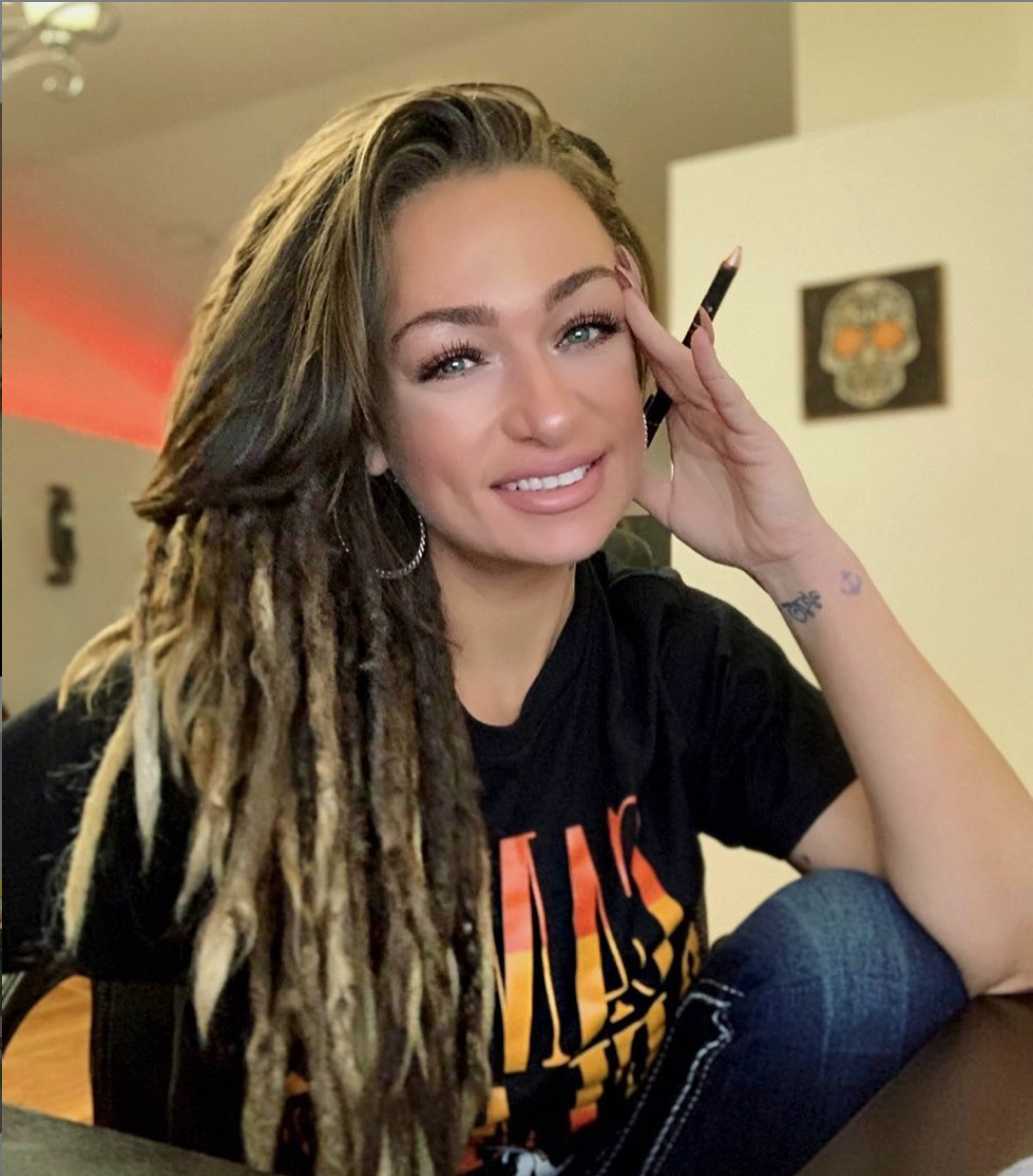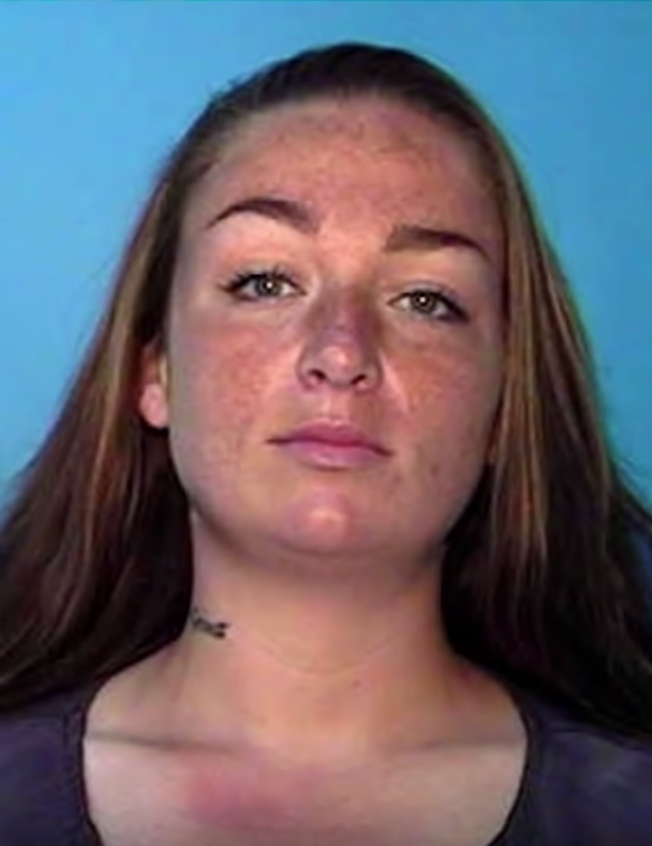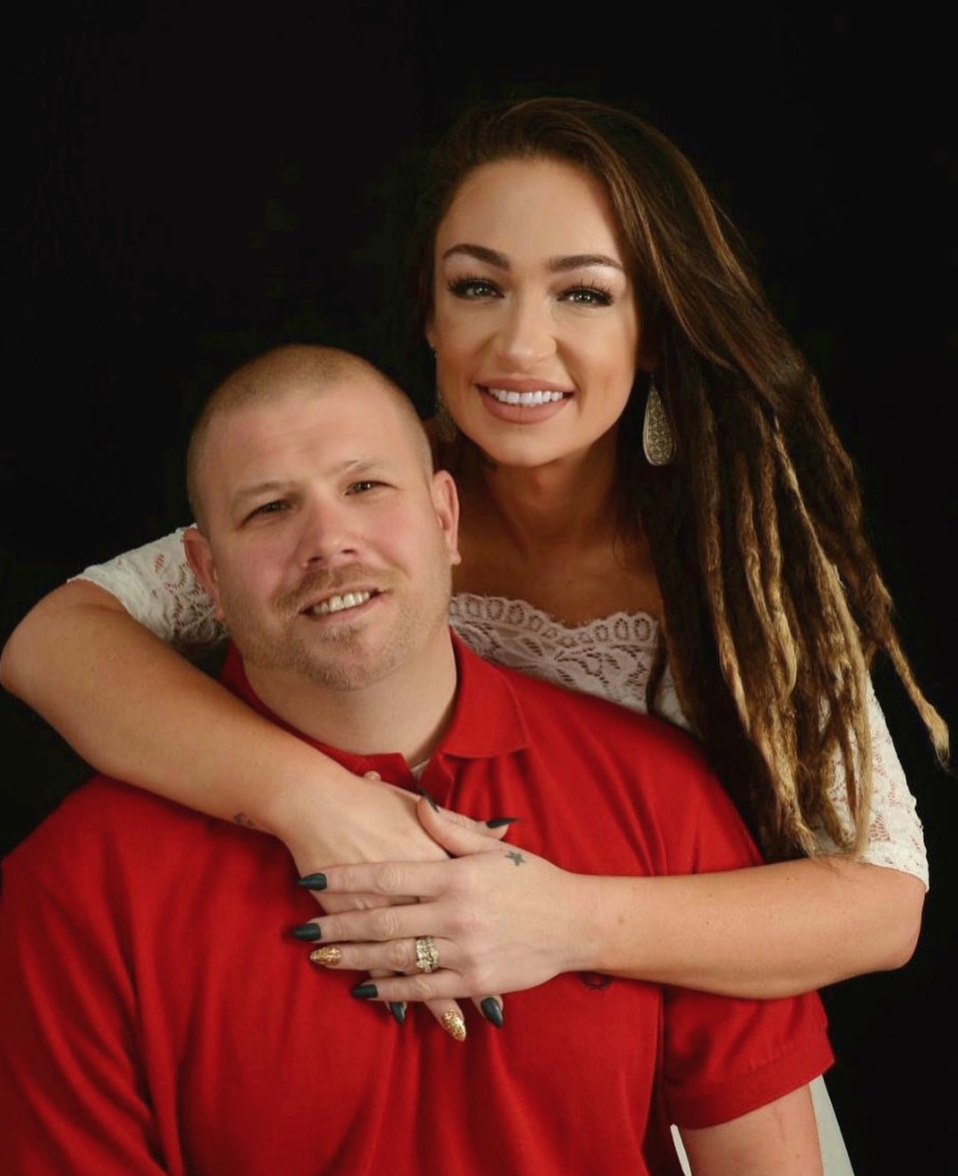YouTube star Christina Randall talks jailhouse religion
Faith found in prison
Christina Randall built a long rap sheet before she amassed a large following on YouTube
LAKELAND, Florida — In one of her most-watched videos on YouTube, Christina Randall recounts the indignity of having to display her lower orifices to a menacing prison guard’s satisfaction during a strip search.
“Because they want you to open up so far that they want to be able to see your freaking throat through your bottom, okay?” she says.
The video has almost 1.3 million views. That’s higher than average on Randall’s channel, which has more than 450,000 subscribers. It has become her primary source of income and led to her TV debut on Bravo’s competition series Spy Games, which premiered on Jan. 20.
Randall, 35, doesn’t know why her videos took off in March 2019, a little over a year after she started posting to the site. She has presented herself with the same quirks and intimacy all along. Maybe it was an algorithm thing, she said. Her stories just seem to resonate with a lot of young women.
Toward the end of the video, after describing a number of other unpleasant prison experiences in sometimes graphic detail, she touches on the one that changed her life. It was an improbable discovery of faith, seeing that she had held such a negative view of jailhouse religion during the time she served for charges of battery, robbery and escape. She used to see other women going to church services and thought it was inauthentic.
“You guys were not trying to get Jesus on the street or you wouldn’t be here,” she said of her attitude at the time. “Now y’all want to come to prison and be all godly, like Bible-thumpers?”
Yet it was a visit from a prison ministry popular among inmates for the food and drinks it brings where Randall had a raw transformative experience.
A childhood stolen
Randall was 1 when her mother, an exotic dancer who did not have custody of her, took her from Florida and fled to Mexico with a man who was involved in drug trafficking. The things he did over the next 17 months were severe enough to imprint the memories in her young mind. The physical scars are still visible.
Randall remembers him turning on the stovetop and placing the backs of her hands on the scalding surface, using a toilet plunger to press them down. He forced her to watch him have sex with her mother, which she isn’t sure whether to call rape. Randall hopes it was, she says, because her mother being a willing participant in what she saw would be worse.
She was kept in a bathroom, which provided her some sense of safety because the door could be locked. Still, it was the scene of more abuse. The man held her by her feet and dunked her head in the toilet. One day, he burst through the door and started kicking her repeatedly in the head, knocking it into the wall and sink until there was blood smeared everywhere. Her mom appeared, threw Randall over her shoulder and took her to a hospital. There, Randall remembers watching a nurse blow into a plastic glove, inflating the fingers to distract her while they stitched the back of her head.
Her mom left her at the hospital. She was 3.
The staff contacted her grandmother in Pensacola, Florida and they were reunited. In a video about the experience, Randall asks her grandmother about the aftermath.
“Horrible,” her grandmother says. “I mean everybody that saw it was just flabbergasted. I mean, nobody could believe that anyone would burn a 2-and-a-half, 3-year-old baby’s hands on a stove because that was the way of punishment.”
“A little mean girl”
Randall’s grandmother was the only constant in an otherwise chaotic life. Behavioral problems manifested early and got her passed from one caretaker to the next.
“And then coming up as a teenager, you were a little mean girl,” her grandmother tells her in a video.
A mugshot from the bad old days. Photo courtesy of Christina Randall.
Randall was barely into her teens and no stranger to police when her run-ins with the law first landed her in a juvenile detention facility. That first arrest was the result of a fight. Scraps with other kids were common as she trod the well-worn path of the wayward teenager, partying with dangerous amounts of alcohol, drugs and all the wrong people.
Randall said she hit a low point when she was 18. She was drunk at a party in a rough area of town when she got into an argument with two girls that turned physical. After a messy trading of blows, the girls got into a car to leave. Randall — in a blackout by this point, she says — jumped in another car and rammed the back of their vehicle several times until she had pushed it into the main road.
Her friends were close behind, in tears and yelling for her to stop before she killed someone. Randall said she remembers regaining her senses and seeing the “demolished” back of the other car. She fled the scene and went to another house, where she called a friend at the party to check if anyone was hurt.
A male friend got on the phone. There was a baby in the back seat of the car she rammed, he said. It was the child of one of the girls and a guy named Jeremy, a high school classmate of Randall’s.
The baby wasn’t hurt, but the shock of the information sank in deep. “I was mortified,” Randall said. “I carried that guilt forever because I would never hurt a child.”
After another fight a few years later — in which she wielded a glass bottle — she landed in prison with a three-year sentence. Randall was sent to Lowell Correctional Institution, Florida’s main women’s facility. She was 21.
During the first half of her time there, she’d see women heading to church services. She was repulsed by the idea, she said. It looked so disingenuous.
A ‘God thing’
Few things represented that apparent inauthenticity as much as the clamor for a spot on the Kairos list. Kairos Prison Ministry International is a non-denominational Christian group that sends teams of volunteers into prisons for three-day events. Everybody gets to know each other, talks, sings and worships. And they eat.
The food and drinks the volunteers bring are the big draw. For people who’ve spent a decade or more inside, it’s the only opportunity to taste food from the outside.
That excitement is the same in every facility, said Craig Combs, a Kairos program coordinator.
To attend, you have to secure a coveted spot on the list. Thirty women at Lowell are selected for each visit. Prisoners can submit their names, and many do. Kairos sometimes asks facility chaplains to put a few names on the list. They ask for people who have some leadership status, some positive and some negative, Combs said. They want to influence people who influence others.
Randall was sitting on her bunk one day when she heard a commotion in the dayroom, an indoor recreation area. She looked and saw the room filled with women trying to push past each other. She thought it was a fight. Someone told her that the form had been posted for people who wanted to submit their names for the Kairos lottery. Names were soon scrawled on every blank spot on the paper — except for Randall’s.
“I didn’t care what kind of food they had. If I’ve got to be in church all day long, that’s the last kind of thing I want to do,” she said.
A few weeks passed. A woman she knew ran up to her, looking excited. The Kairos list had come out, the woman said, and Randall’s name was on it. That couldn’t be, Randall said. A few more people came and told her the same thing.
“Eventually I went and looked at it, and the very last name on the list was my name,” she said.
She continued to resist the idea as the date approached until she had a falling out with a friend on her unit. Another friend urged her to go to Kairos, if only as a vacation from the drama. Randall caved.
On the event’s first day, after she and the others had been checked in, the prison chapel doors opened and a row of women were standing there. They smiled, stretched out their arms and approached the inmates, hugging their way through the group.
It was the first time Randall had been hugged by someone who wasn’t trying to get something from her, she said. She guessed that might be the case for at least a few of the other women, too.
Then the food came out. Randall started eating and kept eating. Everybody did. Pizza, cookies, soda — it kept coming and they kept eating. The volunteers looked on without a hint of judgment, Randall said. They kept giving and seemed happy to do it. Randall was perplexed by it.
“I was judging these ladies,” she said. “I was trying to find something wrong with them so I could make it all make sense, like what do they want?”
One of them sat with her and they started talking. The woman seemed so kind, Randall thought. She envied whatever it was that made her that way. Later on everybody moved to another area of the chapel where everyone started singing and clapping. Randall didn’t join in. She sat there looking around, judging everyone.
“And I felt these tears well up in my eyes, and I’m like, oh heck no. Like, I don’t know what this is. I didn’t even cry when I got sentenced to prison. I’m not — what is going on?” she said.
She closed her eyes to try to make it stop. The tears came harder, streaming down her face. She kept fighting it but soon she was hyperventilating, caught in a tsunami of emotion while her mind raced to try to regain control.
“And I literally thought, please God don’t let nobody touch me,” she said. As soon as the thought came she felt a hand touch her back. “As kooky as this sounds, I felt a shock go through me.”
Randall still didn’t want this, she said, but more hands started rubbing her back. She avoided making eye contact with anyone. When the singing ended, everyone moved back to the first area and she went to the bathroom to get herself together.
“I was like, ‘God, if you are real and you say all I need is faith the size of a mustard seed, you’re going to have to show me because that’s all I got — faith the size of a mustard seed.”
Every Kairos event has a theme, and this one’s was “faith the size of a mustard seed,” a phrase she had been hearing all day.
“I was like, ‘God, if you are real and you say all I need is faith the size of a mustard seed, you’re going to have to show me because that’s all I got — faith the size of a mustard seed.”
After she rejoined the group at a table, she kept crying. It felt like every emotion she had suppressed in her life so far was spilling out, she said. By the end of the day she was exhausted, but felt like a weight had been lifted. When she got back to her bunk, she grabbed the pack of Newports she left there and gave them away.
After she completed the Kairos event, she started going to every church service that was held throughout the week. She doesn’t know anyone from the organization, but she said she hopes they realize how important their work is. She never found out how her name ended up on the list.
“It was a God thing is all I can think of,” Randall said.
Kairos volunteers get about 35 hours of training before they participate in an event, Combs said. It mostly involves being told what to expect — that they’ll be surprised at how much they have in common with people in prison, and how much they’ll enjoy the experience. They’re told to be themselves and avoid intervening too much; to let inmates process things with each other when emotions surge.
Intense displays of emotion are common, Combs said. The simple act of listening to traumatized and guarded people is a powerful ice-breaker. “That doesn’t really happen in prison,” he said. “Nobody cares what they say or do.”
Stages of transformation
Alex Launius, 34, was incarcerated at the same facility. She used to see Randall walking around and was intimidated by her, she said. Launius was on line for commissary one day when Randall approached her.
“Hey Lexi, you gave your life to the Lord, right?” Randall said.
Launius thought Randall was making fun of her. She replied that she had. That conversation was the start of a close friendship. They worked in the chapel together and dug into scripture. True friendships are hard to come by in prison, Launius said. “It was just a really sweet time.”
Randall had read the Bible before but “it was like trying to read Chinese.” She began to understand it, she said. One verse especially hit home: Ezekiel 36:26.
I will give you a new heart; I will put a new spirit in you; I will remove your heart of stone and give you a heart of flesh. - Ezekiel 36:26.
Those words described the transformation Randall was feeling. Her hardness was being replaced by a caring that kept expanding. She used to say whatever she felt like and called it being blunt and honest, “but really I was just being rude and inconsiderate,” she said. Her thinking had turned on its axis now; she cared about what she said and how she treated people.
Randall was released after serving 31 months. She went to live in a women’s shelter and kept going to church. As she got deeper into religion, her newfound confidence tipped over into ego. People in the church who she looked up to were judgmental about other people and their actions, so she allowed herself to be that way.
Jeremy and Christina Randall. Photo courtesy of Christina Randall.
One day, as she sat with Launius — they had been released a few weeks apart — Randall was criticizing a member of one of their discussion groups. Launius interjected.
“I don’t want to judge people,” she said. “I’m so tired of doing this. I’m so tired of judging everybody. I just want to love people. That’s all I want to do.”
It hit Randall “like a ton of bricks,” she said. It was another pivotal moment. She softened even more after that.
Randall bounced around after that, working multiple menial jobs at a time and growing discouraged by her career prospects, limited as they were by her criminal record. She had wanted to become a social worker, but that seemed out of reach. Who would let a convicted violent felon around kids or vulnerable people?
Along the way she received a friend request from Jeremy, the man whose one-year-old son was in the back seat of the car she rammed. She nervously accepted and they struck up a conversation. She told him that she was the person who hit the car. He knew that, he said. He had been more angry with the child’s mother for having him out with her at a place like that.
They kept in touch and got to know each other better. Eventually they got married. Randall ended up helping Jeremy raise his son, who is now in college. They had another son together.
Randall thought YouTube was stupid when she used to see her oldest son watching videos of stuff like kids unboxing new toys. Still, she thought her experiences might reach someone who could learn from them, so she made an account and started posting.
When her audience spiked a year later, it was like “God just opened up the floodgates of love.” The people who watch her videos and comment are more than fans, she said. She feels a spiritual connection to them. People from other religions share how they relate to her faith journey. This level of attention is still overwhelming for someone who isn’t used to having people care what she has to say, Randall said.
“You can cuss me out, you can treat me bad and in a very weird way, that’s my comfort zone because that’s how I spent so much of my life,” she said. “But when I receive love from people, it has been such a foreign feeling in my life that it makes me so emotional.”
Her transformation continues to affect the people who know her, on YouTube and in life.
“She is one of the most grateful people that I’ve ever met,” Launius said. “It’s great to have someone like that, that is always seeing the bright side of things and always just happy to be alive.”
Micah Danney is a Poynter-Koch fellow and a reporter and associate editor for Religion Unplugged.



